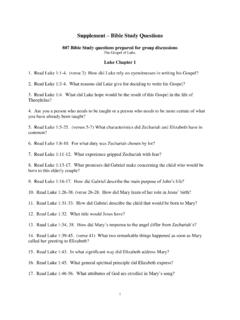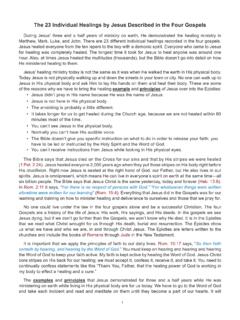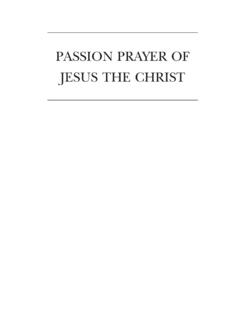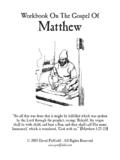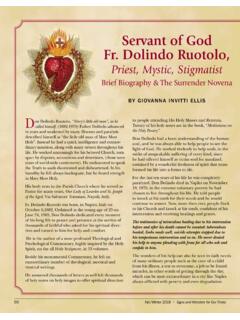Transcription of Health and Healing in the New Testament
1 Health and Healing in the New Testament By Kris D'Atri Introduction Illness and Healing are among humankind s most fundamental concerns. Sacred texts, beliefs and practices regarding Health are naturally prominent in world religions, and Christianity is no exception. The New Testament (hereafter NT) represents a diverse collection of twenty-seven works written and circulated during Christianity s first several centuries. The stories, themes and attitudes regarding Health found in the NT reflect ideas and concerns germane not only to the first and second-century Christians who recorded them, but to Christians throughout the intervening centuries up to the present. This essay provides descriptions and summaries of these NT accounts of Healing , with all biblical citations taken from the New Revised Standard Version of the Bible.
2 It is only a brief overview and does not offer theological opinions or interpretations. Hopefully, it will encourage the reader to do further reflection about his or her understanding of Health and Healing in the context of one's own spiritual beliefs and community life. Several categories of NT writings are rich sources for Christian beliefs, interpretations and practices regarding illness, Health and Healing , especially the Gospels and Epistles. (Acts is thematically a continuation of the Gospels and Revelation does not discuss Healing ). The Gospels contain the stories of Jesus Healing ministry, including the commissioning of the apostles to continue the ministry that is described in Acts. The Epistles contain fewer discussions and references to Healing or Healing miracles, but expand on issues such as the nature and purpose of adversity and suffering.
3 This paper will not attempt to be exhaustive, but rather give an overview of the main stories and themes regarding sickness and Healing in the NT. Before examining these NT texts, however, it is useful to look at the overarching worldview that shaped these particular beliefs. The NT writings are framed by the writings comprising the Hebrew Bible or Old Testament (hereafter OT), as well as by ancient near eastern cultural beliefs and Hellenistic ideas that circulated during the inter-testamental period. For example, the association between sin and sickness has roots both in Hebrew religion and other ancient near eastern religions. Ideas about demons such as those presented in the synoptic Gospels were found in nearly all ancient religions, although demons in Jewish religion were not associated with the Satan figure that became so prominent in Christian beliefs.
4 Exorcism was practiced in various ancient near eastern religions by means of specialized techniques and practices, although somewhat different from Jesus Healing by word or touch. All of these points will be discussed in greater depth below. Although the theological lenses through which sickness and Healing have been regarded in Christianity have varied across time and among denominations, there are two general views of spiritual causes of illness that consistently run through Christian thought and belief. The first is the idea that sickness and affliction can be caused by forces or spirits opposed to God. The cause of illness, according to this view, is Satan, demons, unclean spirits or other malevolent powers that sicken a hapless individual--often an innocent victim.
5 Healing in these cases involves seeking the intervention of divine powers to face down and defeat the spirits or demons. This is the view that predominates in the Gospels. The second view is that trials, including sickness, are caused by God. God may effect sickness for different purposes--as punishment for sin or as impetus for spiritual growth and development. Sickness and other trials in this view are means by which God teaches people or tempers their lives and experiences in order that they may become examples of faith and righteousness for others. Healing in this type of case involves the individual s accepting that he or she has in some way deserved the illness or that there is some divine reason for it. The person seeks to understand God s purpose in bringing on the condition, and strives to grow spiritually and/or alter the nature of his or her life.
6 This perspective is more prevalent in the Epistles and is the fundamental orientation around which most Christians have come to regard illness and Health . Although these two perspectives seem to be oppositional, we will see that the NT contains many examples of both perspectives. Overview: OT beliefs regarding Health and Healing Although this study primarily covers Healing in the NT, a brief overview of the OT will help establish the context for Jesus Healing ministry and the elaboration of early Christian thought represented in the Epistles. The predominant (though not the only) viewpoint of the OT relates to the basic terms of the covenant between Yahweh and God's people: If you obey the commandments of the LORD2 your you shall live and become numerous, and the LORD your God will bless (Deuteronomy 30:16).
7 This covenant is directly expressed in terms of affliction and Healing in Deuteronomy 32:3: I kill and make alive; I wound and Indeed, the examples of God bringing affliction or sickness, or Healing and Health , upon the Hebrews or their enemies are almost too numerous to Job 5:17-18 states, How happy is the one whom God reproves; therefore do not despise the discipline of the Almighty. For he wounds, but he binds up; he smites, but his hands heal. In Leviticus 26:16 and 25, Yahweh specifies the particular punishments, including diseases and physical afflictions that God will bring down upon thepeople if they break the covenant. Psalms that discuss the wretchedness of sickness and plead for deliverance include Psalms 6, 22, 38, 39, 88 and 102.
8 Concomitant to the many examples in the OT of sin or disobedience as causes of sickness and affliction, there are some verses in which forgiveness of sin is linked to Healing . Psalms 103:2-4 is a reminder of Yahweh s beneficence: The forgives all your iniquity, who heals all your diseases, who redeems your life from the Pit, who crowns you with steadfast love and mercy. Psalms 107:17-20 illustrates both: Some were sick through their sinful ways, and because of their iniquity endured affliction .. then they cried to the LORD in their trouble, and he saved them from their distress; he sent out his word and healed them and delivered them from destruction. Psalms 91 talks about Yahweh s protection from pestilence and destruction.
9 Numerous examples of Yahweh s direct or indirect interventions for the Health of the Hebrews (and even some non-Jews) are found in the Deuteronomistic histories, including 1 Samuel 19-20, 2 Kings 4:16-37, 1 Kings 17:17-23, 2 Kings 13:21, 1 Samuel 6:4-5, and 2 Samuel 24:10-25. These examples give a general sense of the theological background of the Jewish community into which Jesus was born. Israelite religion from the time of Abraham was very strictly monotheistic and did not allow for the existence of an evil being concomitant to God. This explains Yahweh s traditional dual role as creator and destroyer, healer and smiter. During the intertestamental period (roughly 3rd century BCE to 1st or 2ndcentury CE), however, Israelite religion gradually came to be influenced by dualistic notions of good and evil found in both Hellenistic thought and Persian religion.
10 The idea of an evil force or figure apart from God slowly became tenable theologically, and indeed the Dead Sea Scrolls are evidence of the rise of dualistic views among Jews even before Jesus and Christianity came onto the scene. Healings and Sickness in the Gospels Jesus apparently had a strong affinity for people suffering from sickness or affliction. As he said in Matthew 9:12, Those who are well have no need of a physician, but those that are sick. This section discusses Healing miracles as a category, the types of diseases and conditions found in the Healing stories in the Gospels, how the healings took place and were described, and the broader context and purpose of these healings.
